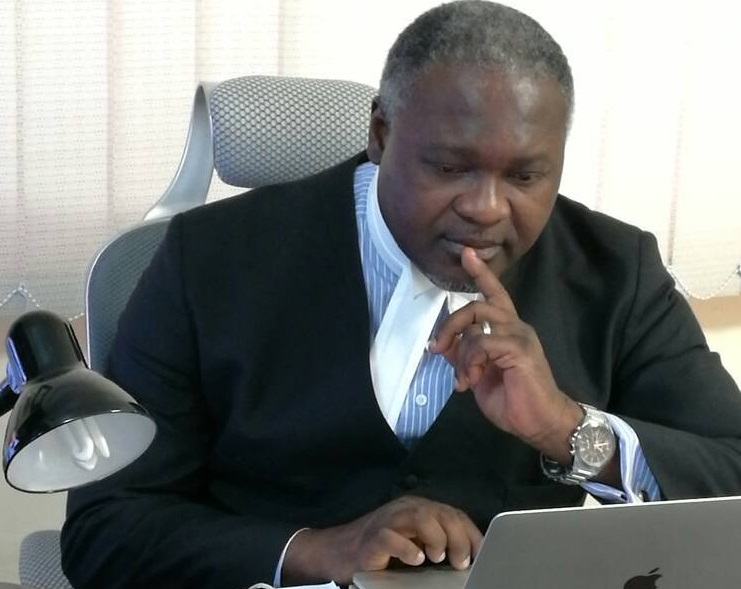By Janet A. Sesay
Lead counsel Joseph Fitzgerald Kamara (JFK) representing appellant Major Alfred Paolo Conteh in his appeal matter yesterday stated before three panel of Judges at the Appeals Court that Justice Momoh Jah Stevens during the treason trial misdirected the jurors on the decision of fact in counts 10 and 11 of the indictment and therefore made the jurors to return a guilty verdict against his client, resulting to him being sentenced to 2 years.
The justices include Presiding Justice Ivan Ansumana Sesay, Fatmata BintuAlhadi and Tonia Bennett.
In his submission the lead appellant counsel JFK stated that the appellant was struck by the high court and was convicted on two counts, 10 and 11. He said the jurors returned a verdict of guilty on counts 10 and 11 relative to the Arms and Ammunitions Act of 2014.
He said the learned judge without any reason handed down the maximum sentences permitted under the regulation, without option or a fine, and asked the sentence run consecutively.
JFK continued that the judge arrived at his judgment on facts and not on law, citing that it is the duty of the jurors to reach their conclusions on facts in any case, while it is the judges’ to reach theirs on the law.
Lawyer Kamara said the onus of proof in any criminal trial rests entirely on the prosecution. He said the judge did not only misdirected himself, but he also did the jurors on the decision or determination of fact, and that the judge reached a conclusion that was reserved for the jurors; in other words, the judge usurped the function of the jurors, which is fatal in any criminal proceeding.
He submitted that the judge singularly failed to instruct the jurors on the burden of proof. Counsel Kamara cited Marsh et al vs the State in 1970 to 1971, ruled in favour of Marsh, and furthered that following the Marsh ruling he invited the court to squash the conviction on counts 10 and 11 because in the judge’s summing up he was generic in explaining to the jurors the burden and standard of proof.
Lawyer Kamara said in the statement of offence in count 10 of the indictment, the allegation was that Paolo kept a greater number of small arms than specified in his license, and that in the particular of offence, the allegation was that he owned a greater number of small arms; he submitted that count 10 charged two types of offences, which he called duplicity and uncertainty.
He furthered that in any criminal trial or court one offence should be charged, “but there were two offences charged here which talk about keeping and owning.”
He said a person can keep without owning and that one act can be committed in the alternative. He said when a word is used it clearly diverse disjunction and this he submitted created two offences; the owning and keeping, and both cannot be charged under the same counts.
He further that count 10 of the indictment failed the sufficiency test in law as is under section 23(5)(a) of the constitution of Sierra Leone. Lawyer Kamara submitted that where two offences are being charged in one count, it leads to duplicity and uncertainty, for which he implored the court to squash the conviction on count 10.
He submitted that count 10 is not only duplicity but bad of certainty, which he said failed the legal sufficiency test as predicated in section 23(5) of the constitution of Sierra Leone.
He ended his submission that the learned judge also misdirected himself on the confession and said that at no time during the proceedings did his client confessed to the offences he was on trial for. He said that the judge wrongly shifted the burden to the appellant and such conviction he said must be squashed.
Wara Serry Kamal in her submission said the judge also failed to direct the jurors on the inadequacy of the evidence that the appellant was in possession of a loaded weapon in a public place, or count 11. She submitted that when the appellant was arrested he was not with a weapon, but at the time he entered State House he gave his bag to the security apparatus.
She said in this case the issue of constructive possession was never raised by the prosecution who had the burden of proof. She said the prosecution failed to show an iota of evidence that the appellant was found with a weapon in a public place.
She continued that the prosecution also failed to establish what a public place is, as the prosecution described State House as a public place. She said the judge in page 419 of his summing up declared State House as a public place, but State House, she said in her submission, is not a public place. She said the judge took the decision from the jurors to determine if State House was a public place.
She ended her submission that her client was a first time offender and even though a plea mitigation was made on his behalf, he was given the maximum sentence.
She said based upon the argument put before the court in counts 10 and 11 of the indictment in respect of sentencing and conviction, she pleaded with the court to discharge the appellant on both counts. The matter was adjourned to 19th January 2021 and the appellant was remanded.
